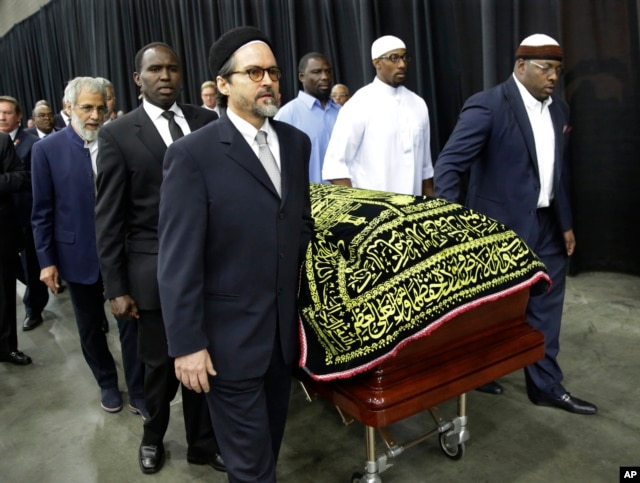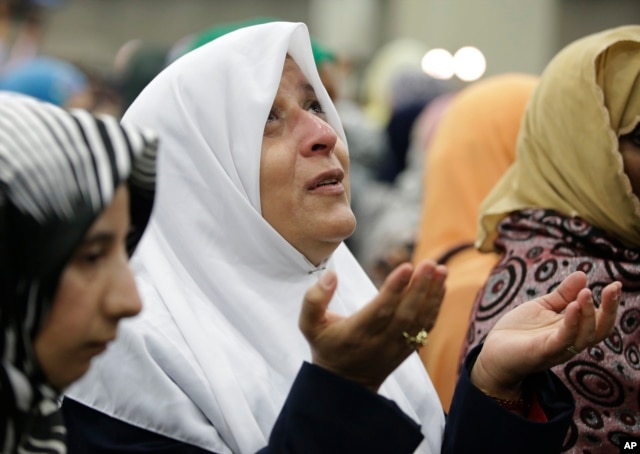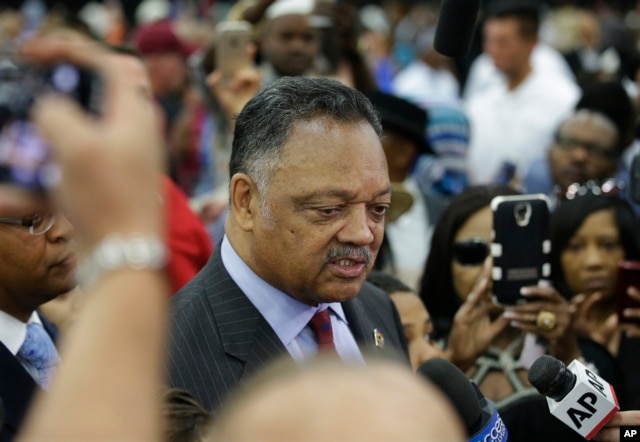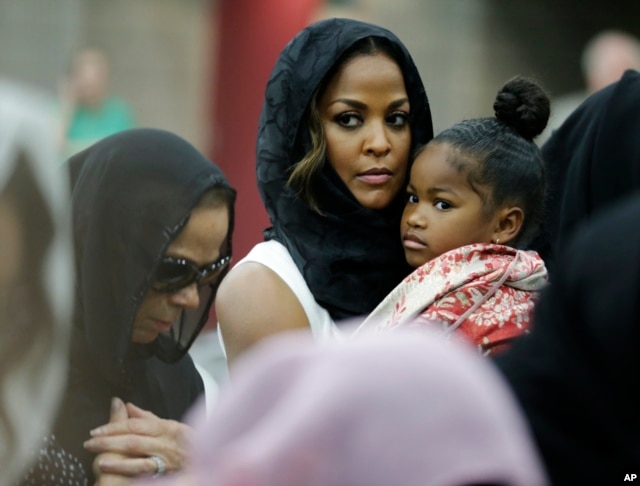At Prayer Service, Ali Serves as Beacon of Truth, Ambassador for Islam

LOUISVILLE, KENTUCKY—The “most famous American Muslim ever” was remembered and mourned in a Jenazah prayer service Thursday in Louisville, Kentucky.
“People did not know there is Islam in America before Muhammad Ali,” said Mohamed Magid, imam of a mosque outside Washington, D.C., one of the largest in the United States.
“They didn't know how many Muslims are there — who are they — but Muhammad Ali brought that ... to the front. He is the most famous American Muslim ever," Magid said.
Like many of the thousands attending the service in Louisville's Freedom Hall, Magid is not a native American.
Muhammad Ali's casket is escorted by pallbearers for his Jenazah, a traditional Muslim service, at Freedom Hall in Louisville, Ky., June 9, 2016.
He came to the U.S. from Sudan in 1988 and now ministers to 30,000 Sudanese at the All Dulles Area Muslim Society near the nation's capital.
What Magid loved about the funeral for the famous boxer, who died last week of complications from Parkinson’s disease, is that it drew Muslims from all over the world.
“Shia, Sunni, Salafi, Sufi, name it. All of them are here," he said. "That is Muhammad Ali."
Magid met Ali twice, the first time in Sudan, where the Sudanese embraced the boxer as if he were one of their own. And no wonder. Ali was a household name in Sudan.
"We grew up with the beautiful name of Muhammad Ali," Magid said. "People used to say, if somebody is very assertive, they say, ‘What? Do you think you are Muhammad Ali?' That's how much he meant to young people growing up in Sudan.”
A Muslim woman prays before Muhammad Ali's Jenazah, a traditional Islamic service, at Freedom Hall in Louisville, Ky., June 9, 2016.
The Jenazah not only generated good vibes inside Freedom Hall but potentially sent them around the world.
"I think as an advocate for justice and an advocate for truth, [Ali] always served as an ambassador of our faith, and it's fitting that now even in his passing, he is serving in that capacity,” said Roula Allouch, chair of the Council on American-Islamic Relations. "So many people from around the country and across the world will be able to see an Islamic prayer service and see Muslims in this country and around the world pray for him.”
Civil rights advocate Jesse Jackson said the service reaffirmed that Islam is a religion of peace.
“The three great religions — Judaism, Christianity, Islam — are religions of peace, and in the name of these religions, there have been some ugly things that happened," Jackson said. "But these religions matter so much to so many people around the world. To affirm Ali is to affirm his religion.”
American civil rights activist Jesse Jackson speaks to members of the media before Muhammad Ali's Jenazah, a traditional Muslim service, at Freedom Hall in Louisville, Ky., June 9, 2016.
The most important thing about the Jenazah was for Muslims to come together and pray for the departed soul. But across the country and around the world, people who could not come together at Freedom Hall also were praying for their “beloved brother.”
Nadia Hassan, a Muslim-American from California now living in the Washington area, came to the Jenazah to stand in for her deceased father and uncle, who had been friends of Ali.
“I'm here to represent the Hassan family, and we are just here to pay our respects to the Ali family,” she said.
Hugging a picture of herself as a baby with Ali, Hassan said that in today’s environment, which is often not friendly toward Muslims, she holds on to what Ali stood for and "his contributions to society, his contributions to the world, what it means to be truthful, honest, to stand up for justice, to speak truth to power. To fight back against systemic racism. Not to allow anyone to bully you."
Hassan swallowed to maintain her composure. “All of these values I carry with me, and I live with his spirit within me.”
Topics: American Muslims, Janazah (Funeral Ritual), Muhammad Ali
Views: 2584
Related Suggestions





















